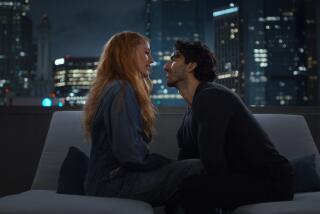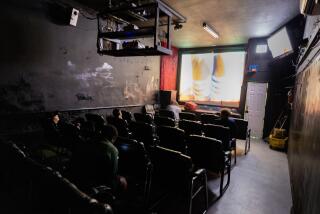Death to U.S., but Not Films
- Share via
Since the United States began bombing Afghanistan, a chorus of anti-American rhetoric has filled the streets of the Muslim world from Indonesia to Pakistan to the Middle East. But there is one place where many Muslims still warmly embrace what America has to offer--the local cinema.
Whether it’s the epic tale of a doomed ocean liner in “Titanic,” the fancy swordplay of Antonio Banderas in “The Mask of Zorro,” or Julia Roberts’ toothy smile in “My Best Friend’s Wedding,” American movies continue to enthrall and entertain audiences in Lebanon, Syria, Malaysia and across the Islamic world.
Talk to young, middle-class Egyptians at the six-story Ramses Hilton Annex in downtown Cairo, where the adrenaline-fueled drag-racing movie “The Fast and the Furious” is playing, and they will tell you that no matter how much Arabs may criticize the American bombing, they love American movies.
“I don’t see a connection between the attacks and my attitude toward American movies,” said Karim Tobgi, 18, a recent high school graduate. “The attack is reality. Movies are entertainment, and it’s only a movie.”
His friend, 16-year-old Ahmad Akkad, added: “I only watch American movies because they’re the best. I love the United States. It’s a civilized country and I love traveling there. Every time I watch an American movie, it reminds me of the good times I spent in America.”
The allure of Hollywood films in societies where “Death to America” is being chanted in the streets is a testament to the raw power of U.S. popular culture, a force that seems to transcend politics, foreign policy, even war. The box office lines also reflect Hollywood’s preeminence at crafting crowd-pleasing mass entertainment.
“Hollywood movies have always been made with an audience in mind and that has not always been the case with the cinema in other parts of the world,” said Rick Jewell, associate dean of USC’s School of Cinema-Television. “In most countries, the government subsidizes filmmakers who think of themselves first and foremost as artists . . . and they are less interested in whether they reach a broad audience.”
Hollywood filmmakers, Jewell said, figured out early on that there are “certain stories, certain kinds of mythic entertainment, that would speak to people no matter what type of culture they grew up in. . . . In terms of spectacle and technical polish and the quality of acting, nobody does it better and probably nobody ever has.”
John Sinno, president of Arab Film Distribution in Seattle, the largest distributor of Arab-made movies in the United States, grew up in Lebanon and has traveled widely in the region. He said moviegoers in the Middle East, like moviegoers anywhere, crave the escape that films provide.
“The Arab masses love to go to the Hollywood productions. They watch these films about terrorists and cheer the Americans. . . . ‘Rambo’ was one of the biggest hits in the Arab world when I was there,” he said.
The Muslim world remains divided over this Western influence. In countries with a more cosmopolitan tradition, like Egypt, Lebanon and Turkey, Hollywood movies are more popular than in more conservative Islamic states such as Saudi Arabia.
In the Pakistani desert city of Quetta, mobs encouraged by Muslim clerics chanted “Death to America” to protest the U.S. bombing and set fire to three movie theaters, including one showing “Desperado” starring Banderas.
But many Muslims are quick to separate politics from entertainment.
Islam Bouda, a 25-year-old business major at Al-Azhar University in Cairo, the most prestigious seat of learning among mainstream Sunni Muslims, likes the same movie stars that American fans line up to see.
“I love Kevin Costner and Jim Carrey,” Bouda said. “I think Jim Carrey is brilliant because he’s a comedian who tackles serious topics. I like Tom Cruise because he’s a familiar character. I can be like him.”
The Muslim world makes up less than 10% of the overseas box office for Hollywood movies, say studio executives, but attendance in those regions shows steady growth. Though the Sept. 11 terrorist attacks caused movie attendance to drop 12% to 20% worldwide, it has begun to recover.
Growth in attendance at American films in the Muslim world is limited not by politics or culture, but by a paucity of multiplexes, according to U.S. distribution executives.
No Hollywood studio contacted by The Times would allow its executives to speak for quotation about sales of American films in the Muslim world. But executives say privately that despite censorship laws in those countries, their films often do well.
In Turkey, a healthy market for U.S. films, “The Mexican,” starring Roberts and Brad Pitt, drew 81,000 people on its opening weekend of July 6 and remained the country’s No. 1 picture for four weeks.
Movies that are hits in the United States often do extremely well in Muslim countries, especially special-effects-driven action films. Comedies generally don’t travel as well.
According to figures compiled by the Hollywood studios, the top 10 grossing films in the Middle East over the last 15 years were, in descending order: “Titanic,” “The Mask of Zorro,” “Godzilla,” “Independence Day,” “Bean,” “The Man in the Iron Mask,” “The Lost World: Jurassic Park,” “The Jackal,” “The Mummy” and “My Best Friend’s Wedding.”
In Indonesia, which has the world’s largest Muslim population, the highest-grossing films over the last 15 years were: “Titanic,” “Jurassic Park III,” “Independence Day,” “Mission: Impossible 2,” “Tomorrow Never Dies,” “Armageddon,” “GoldenEye,” “Godzilla,” “The Mummy” and “End of Days.”
It is in the area of sex that the cultures of Hollywood and the Muslim world clash most often.
When Universal Pictures released its hit sequel, “The Mummy Returns,” earlier this year in Malaysia, the studio was forced to trim the kissing scenes between Brendan Fraser and Rachel Weisz, even though the actors portray a married couple.
Egyptian director Magdy Ahmed Aly recalls that when the Oscar-winning film “American Beauty” was screened in Egypt, seven minutes of sex-related scenes between the frustrated suburban father Kevin Spacey and Mena Suvari, who played a teenage cheerleader, were removed by government censors. Curiously, he added, the homosexual themes running through the film were left intact.
“It is not easy for sexy things to get past the censor,” said Adel Kamel, who writes on culture and entertainment for a large Sunday newspaper in Cairo called Watabin. As for violence, he added: “Our people don’t like violence at all, but there are some things permitted if the violence is limited.”
Kamel rattled off some of the Hollywood movies currently playing around Cairo and proving popular. They included John Travolta in “Swordfish,” Nicole Kidman in “Moulin Rouge,” the dinosaur sequel “Jurassic Park III,” the Nicolas Cage World War II romantic drama, “Capt. Corelli’s Mandolin,” and the Roberts comedy, “America’s Sweethearts.”
“American cinema has been the most popular cinema for Egyptians for the last 100 years,” Kamel said. [Egyptians] even follow the very private lives of the movie stars in America. All the stars are very popular here.”
Muhfouz Doss, the Hollywood correspondent for Watabin and a former president of the Hollywood Foreign Press Assn., recalled that a few years ago Travolta flew to Cairo, noticed a large crowd on the ground and thought that a political demonstration was underway.
“When he deplaned,” Doss said, “he was surprised when they rushed to meet him. It was not a political demonstration, but a welcome.”
To moviegoers in Cairo, Hollywood entertainment crosses political and cultural lines.
Ask Gasser Tantawi, a 29-year-old engineer, and Mai Abdel-Rahman, a 25-year-old bank employee, who recently purchased two tickets to see “The Fast and the Furious” at a theater in downtown Cairo.
“I don’t hate America,” Tantawi said, “but I do believe that the American government has one principle and that is as long as the Americans are living well, they don’t care about what is happening outside America, and this is wrong.”
Near a poster for MGM’s Reese Witherspoon comedy “Legally Blond,” which depicts an American blond in a short blue dress, her hair blowing in the wind, 50-year-old school administrator Taghreed Ahmad, who wears a veil, bought a ticket to see Kidman star as a courtesan in “Moulin Rouge,” a musical set in 1899 Paris at the notorious Parisian cabaret club the Moulin Rouge.
“I don’t like Americans because they oppress the Arabs and Muslims,” Ahmad said. “Unfortunately, all Western culture has been transported to our daily life. Look around.”
She pointed to a nearby McDonald’s.
“Yes, I view the Western culture as decadent,” she said. “They have no limits and everything is allowed. But it is up to each individual to decide how to let that affect him. People put limits to themselves and decide what they let influence their behavior. In the end, movies are about business, about money.”
*
Times staff writer Welkos reported from Los Angeles and special correspondent Yehia from Cairo. Freelance writer Judy Stone also contributed to this report.
More to Read
Only good movies
Get the Indie Focus newsletter, Mark Olsen's weekly guide to the world of cinema.
You may occasionally receive promotional content from the Los Angeles Times.









